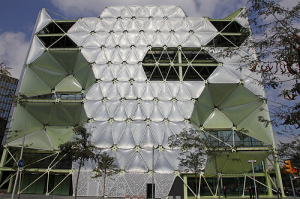If the first Gigabit City Summit was about how cities learn from each other, then the second installment was where the real learning got started.
Early this past Wednesday morning, on the eve of Google’s long-anticipated Fiber announcement, Kansas City leaders got an important reminder: Don’t let Google Fiber distract you from what you’re already doing.
That advice came from Bill Hutchison, founder of the iCANADA Alliance and developer of intelligent community projects in Toronto and Skolkovo, Russia.
Part of the Gigabit City Summit Core Team, Hutchison (speaking from Moscow), joined fellow team members via Cisco videoconference from Amsterdam, Barcelona, and Singapore to talk about how they’ve built and successfully sustained smart city projects in places far and wide. Their projects are the kinds of technology-driven, economy-boosting initiatives that Kansas City has begun dreaming of since being given the Google Fiber golden ticket in 2010. And they’ve done it all without the benefit of Google.
Unlike in KC, which is having its network infrastructure installed for free courtesy of Silicon Valley’s most powerful tech company, Hutchison and his colleagues come from places where no one handed them the keys to the broadband. Yet they have managed to collaborate with local businesses, governments, and organizations to create landscape-altering projects such as the 22@ Barcelona innovation district, which transformed an industrial portion of the city into a hub of entrepreneurship and technology-based urban renewal; and theAmsterdam Innovation Motor, which has brought fiber to 100,000 households and expects to have the entire city connected in three years.
For Kansas City, a metropolis on the brink of lighting-fast connectivity, learning from other cities’ successes is crucial. Over the remaining 10 months, the Gigabit City Summit will offer a distance-learning course in smart city planning.
Session 2: Leadership, Organization, and Community Challenges
The theme of the July 25 session, “Leadership, Organization, and Community Challenges,” addressed the issue of how cities can succeed in a new, Internet-empowered economy that prizes sustainability, civic-supported innovation, open access, constant connectivity, high-performance collaboration, and the breaking down of silos. The goal: to spur innovation on a local level so that your city can compete globally.
Following introductory remarks by organizer Dave Sandel of Sandel + Associates and facilitator Mike Brown of the Brainzooming Group, the Core Team members gave presentations about their cities’ respective projects.
Some highlights:
- Bill Hutchison outlined his intelligent community work in Toronto and Skolkovo, noting that community outreach is essential with visionary projects that take years to break ground and cost millions of dollars. (He amusingly compared the act of selling sky-high gigabit concepts to the populace with the plight of Eureka salesmen peddling vacuums to 1940s housewives.)
- Ger Baron and Isabel Brouwer described the philosophies the power the Amsterdam Innovation Motor, a cluster-based knowledge network that unites innovators across all realms — science, creative trades, entrepreneurship, medicine — into a knowledge network that has created jobs, broken down silos, and made Amsterdam a global, new-economy player. (Watch a cool video about AIM.)
- Gordon Falconer, director of Urban Innovation at the Cisco Internet Business Solutions Group in Singapore, talked about the advantages of working in a city-state where there are fewer regulatory roadblocks to innovation and the government takes a proactive approach in implementing economic-development initiatives and attracting global collaborators.
- Josep Pique and Carles Sans gave a comprehensive look at the Barcelona Digital Technology Centre, a 2,000 sq. meter building located in the heart of 22@Barcelona that houses a 100-employee team of IT and communication technology engineers who proffer a multitude of expert services to the local business community, from mobile app design to telecom to training.
- Lastly, David Warm of Kansas City’s Mid-America Regional Council (MARC) shared the strategies that shaped the Mayors’ Bistate Innovation Team’s Google Fiber playbook, namely:(1) Universal Access, (2) Driving Innovation, (3) Expanding Economic Opportunities, (3) Establishing Global Presence.
A WebEx archive of the session presentation slides and audio will be available soon courtesy of the Smart + Connected Cities Institute.
Conclusion: Fiber Going Forward
The Summit ended on a hopeful note for Kansas City.
Much as they did at the first Summit (in the presence of Mayors Sly James and Joe Reardon of KCMO and KCK), the Core Team applauded MBIT’s playbook as a good framework for making KC a smarter, more connected place — a framework, remember, that was devised with no actual knowledge of how the Fiber program would shake out.
Now that Google has officially announced its pricing plans and rollout schedule for providing Fiber to KC residential neighborhoods (but only those that show adequate demand), it’s time to start thinking about implementation.
Stay tuned for more upcoming GCS sessions, including the August 22 Summit on “Open Government, Big Data, and Innovation,” at gigabitcitysummit.com, on Twitter at @gigcitysummit and at facebook.com/gigcitysummit.

